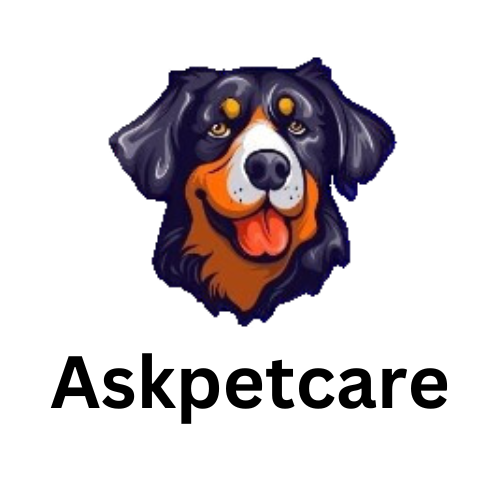Hello, dog lovers today I will explain in detail Why German shepherd aggressive towards family members.
Living with German shepherds is very wonderful because they are very loyal and smart. But sometimes they act aggressively towards family members, which can be worrying.in, this blog we will explore why German shepherds might show aggression towards their family members. In this blog, we will also learn how we can deal with it to keep everyone safe and happy at home.
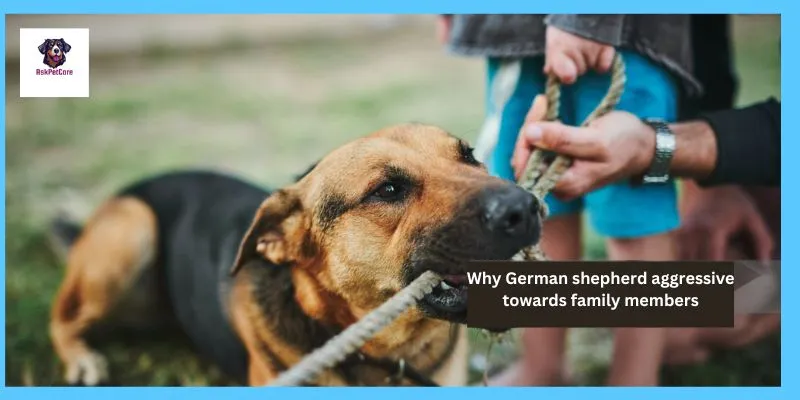
Hello everyone who loves dogs! I’m Dr. Arif Aziz, and I’ve been taking care of pets especially dogs at my clinic for a long time, exactly 14 years! I’m here to share some valuable information with you that I’ve gathered from books during my study time written by experts in veterinary medicine (DVM) and MSC (Master of Science), as well as from my own experiences working with dogs.
Why German shepherd aggressive towards family members:15 reasons
Here are fifteen reasons a veterinarian might consider for German Shepherd aggression towards family members:
- Territorial Behavior: German Shepherds are naturally territorial and may become aggressive towards family members perceived as intruders in their space.
- Protective Instincts: Their strong protective instincts can lead them to display aggression towards family members if they perceive a threat to themselves or their human pack.
- Fear or Anxiety: Aggression may stem from fear or anxiety, especially if the dog feels threatened or uncertain about a family member’s actions.
- Lack of Socialization: Insufficient exposure to different people and situations during puppyhood can result in fear-based aggression towards family members they haven’t been properly introduced to.
- Resource Guarding: German Shepherds may exhibit aggression when they feel their resources such as food, toys, or sleeping areas are being threatened by family members.
- Health Issues: Pain or discomfort due to injury, illness, or underlying health problems can trigger aggression towards family members as a defensive response.
- Miscommunication: Lack of clear communication or understanding between the dog and family members can lead to misunderstandings and potential aggression.
- Predatory Drive: German Shepherds have a strong prey drive, and they may display aggression towards family members, especially children, if they perceive them as prey-like objects.
- Genetic Predisposition: Some German Shepherds may have genetic predispositions towards certain behavioral traits, including aggression, which can be exacerbated by environmental factors.
- Maternal Instincts: Female German Shepherds, especially those with maternal instincts, may become aggressive towards family members perceived as threats to their puppies or their maternal role.
- Pack Dynamics: In households where there is uncertainty in pack leadership, German Shepherds may become aggressive as they attempt to establish their position within the family hierarchy.
- Previous Trauma: Past traumatic experiences, such as abuse or neglect, can result in behavioral issues including aggression towards family members.
- Lack of Exercise or Stimulation: German Shepherds are active breeds that require ample physical exercise and mental stimulation. Without proper outlets for their energy, they may exhibit aggressive behaviors toward family members out of frustration.
- Environmental Stressors: Changes in the environment, such as moving to a new home or the addition of new family members or pets, can trigger stress and anxiety leading to aggression.
- Unintentional Reinforcement: Unintentionally reinforcing aggressive behaviors through inconsistent discipline or inadvertently rewarding aggressive displays can perpetuate the problem.
Understanding the underlying reasons for aggression is essential for effective management and behavior modification. Veterinarians can work alongside dog behaviorists and trainers to develop a comprehensive plan tailored to the specific needs of the dog and the family.
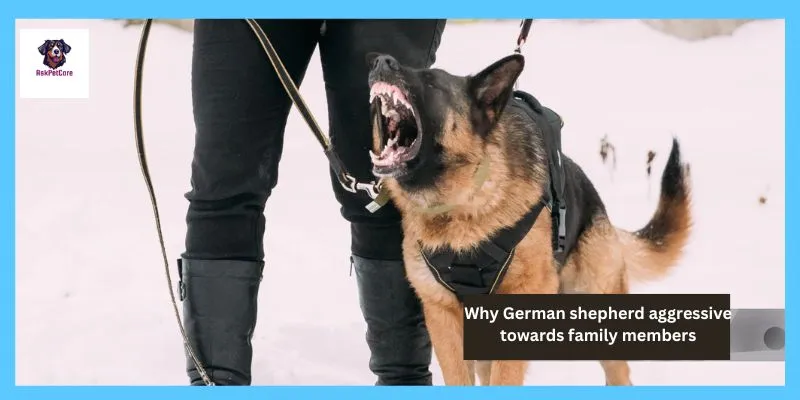
Why is my male dog being aggressive all of a sudden?
As a vet, sudden aggression in male dogs can be concerning and may stem from various factors. Here are fifteen potential reasons for sudden aggression:
- Pain or Discomfort: Dogs may exhibit sudden aggression if they’re experiencing pain or discomfort due to an injury, illness, or underlying health condition.
- Fear or Anxiety: Changes in the environment, new stimuli, or previous traumatic experiences can trigger fear or anxiety in dogs, leading to sudden aggression as a defensive response.
- Hormonal Changes: Unneutered male dogs may experience sudden aggression due to hormonal fluctuations, especially during breeding season or if they encounter a female in heat.
- Maternal Instincts: Male dogs, even if neutered, may exhibit protective or aggressive behavior if they sense a perceived threat to their offspring or if they encounter unfamiliar puppies.
- Territorial Behavior: Sudden aggression may occur if the dog perceives a threat to its territory, such as a new pet or person entering its space.
- Resource Guarding: Dogs may become suddenly aggressive if they feel their resources, such as food, toys, or sleeping areas, are being threatened or taken away.
- Lack of Socialization: Inadequate socialization during puppyhood can lead to fear-based aggression towards unfamiliar people or animals, especially in new or stressful situations.
- Frustration or Overstimulation: Dogs may exhibit sudden aggression when they’re frustrated or overstimulated, such as during playtime or when restrained.
- Redirected Aggression: Dogs may redirect their aggression towards nearby individuals or animals if they’re unable to access the source of their frustration, such as a perceived threat outside a window or door.
- Predatory Drive: Sudden aggression may occur if the dog’s prey drive is triggered, such as seeing small animals or running children.
- Medical Conditions: Certain medical conditions, such as neurological disorders or brain tumors, can cause changes in behavior, including sudden aggression.
- Age-Related Changes: Senior dogs may experience cognitive decline or pain-related issues that can lead to sudden changes in behavior, including aggression.
- Lack of Training or Boundaries: Dogs may exhibit sudden aggression if they haven’t been properly trained or if there’s a lack of clear boundaries and leadership within the household.
- Previous Trauma: Dogs with a history of abuse or neglect may display sudden aggression as a result of past traumatic experiences.
- Genetic Factors: Some breeds may have genetic predispositions towards certain types of aggression, which can manifest suddenly under certain circumstances.
It’s essential to consult with a veterinarian or qualified dog behaviorist to determine the underlying cause of sudden aggression in your male dog. A thorough evaluation, including a physical examination and behavioral assessment, can help identify any medical or behavioral issues and guide appropriate treatment and management strategies.

How to stop dog aggression towards humans.
As a veterinarian, addressing dog aggression towards humans is crucial for the safety and well-being of both the dog and the people involved. Here are fifteen methods to stop dog aggression toward humans:
- Identify Triggers: Determine what triggers the aggression, whether it’s specific actions, situations, or individuals, to better understand and address the underlying cause.
- Consult a Professional: Seek guidance from a qualified dog behaviorist or trainer who can assess the situation and develop a tailored behavior modification plan.
- Medical Evaluation: Rule out any underlying medical issues that could be contributing to the aggression through a thorough veterinary examination, including blood tests and imaging if necessary.
- Positive Reinforcement: Use positive reinforcement techniques to encourage desired behaviors and reinforce calm, non-aggressive responses to stimuli.
- Desensitization and Counterconditioning: Gradually expose the dog to the trigger in a controlled environment while pairing it with positive experiences, such as treats or play, to change the dog’s emotional response.
- Avoid Punishment: Avoid using punishment-based methods, as they can exacerbate fear and aggression and damage the trust between the dog and the handler.
- Behavioral Management: Implement management strategies to prevent situations that trigger aggression, such as using a leash or baby gate to control interactions with visitors.
- Obedience Training: Teach basic obedience commands, such as “sit,” “stay,” and “leave it,” to provide the dog with structure and promote impulse control.
- Exercise and Mental Stimulation: Ensure the dog receives regular exercise and mental stimulation to prevent boredom and reduce stress, which can contribute to aggressive behavior.
- Establish Leadership: Establish yourself as a calm, confident leader through consistent training, clear communication, and setting and enforcing boundaries.
- Create Safe Spaces: Provide the dog with a designated safe space, such as a crate or quiet room, where they can retreat and relax when feeling overwhelmed or anxious.
- Behavior Modification Aids: Consider using behavior modification aids such as head halters or muzzle training to safely manage the dog’s behavior during training sessions or in potentially risky situations.
- Medication: In severe cases or when aggression is due to underlying anxiety or fear, medication prescribed by a veterinarian, such as antidepressants or anti-anxiety medications, may be necessary to facilitate behavior modification.
- Environmental Management: Remove or modify environmental stressors that may contribute to aggression, such as loud noises or crowded spaces, to create a more comfortable and predictable environment for the dog.
- Consistency and Patience: Be consistent in applying training techniques and patient in allowing the dog time to learn new behaviors. Addressing aggression towards humans requires time, dedication, and a compassionate approach.
It’s essential to tailor the approach based on the individual dog’s temperament, triggers, and specific circumstances. Progress may be gradual, but with patience, consistency, and professional guidance, many dogs can learn to overcome their aggression toward humans and live harmoniously with their families.
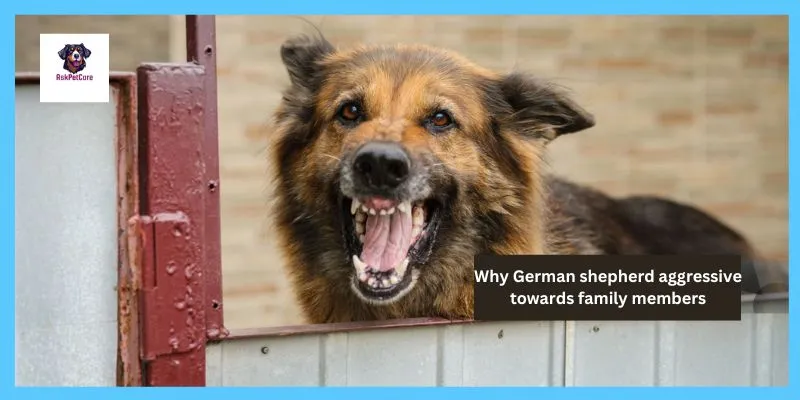
At what age does GSD become aggressive?
As a vet, it’s important to note that aggression in German Shepherds (GSDs) can manifest at different ages and for various reasons. Here’s an overview of when aggression might appear in GSDs and how it might be explained:
- Puppyhood: Aggression in GSDs can sometimes begin to show during puppyhood, typically between 6 to 14 months of age. This aggression is often related to fear, insecurity, or lack of proper socialization. Puppies may display aggression as they navigate new experiences and encounters with people, animals, and environments.
- Adolescence: As GSDs enter adolescence, which typically occurs between 6 to 18 months of age, hormonal changes can influence behavior. Unneutered male GSDs may exhibit more assertive or territorial behaviors during this time. Aggression may arise as they test boundaries and assert their independence, particularly if there’s a lack of consistent training and leadership from their owners.
- Maturity: Aggression can also emerge in mature GSDs, typically between 1.5 to 4 years of age. This aggression may be related to territorial instincts, protective behaviors, or resource guarding. GSDs are known for their loyalty and protective nature, which can sometimes lead to aggression towards perceived threats or intruders.
- Old Age: While less common, aggression in senior GSDs can occur due to age-related cognitive decline, pain-related issues, or changes in their environment or routine. Senior dogs may become more irritable or anxious, which can manifest as aggression towards humans or other animals.
It’s important to recognize that not all GSDs will exhibit aggression, and individual temperament, genetics, socialization, training, and environmental factors all play significant roles in a dog’s behavior. Responsible breeding practices, early socialization, consistent training, and providing a stimulating and supportive environment can help mitigate the risk of aggression in GSDs.
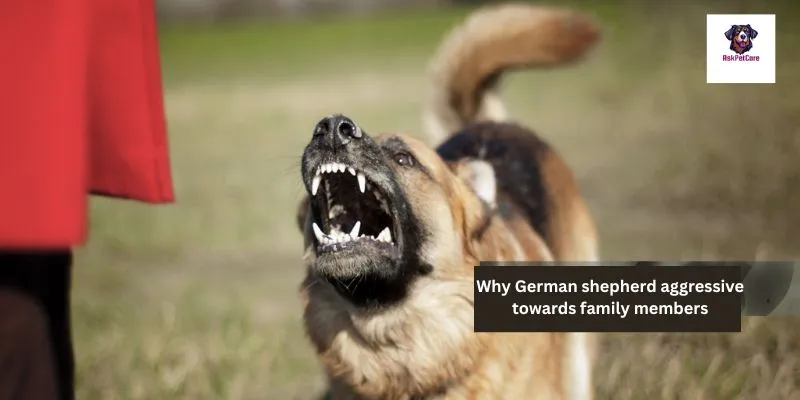
As a vet, I advise owners to monitor their GSD’s behavior closely from puppyhood through adulthood and seek professional guidance if any signs of aggression emerge. Early intervention, appropriate training, and behavioral modification techniques can help address and manage aggression in GSDs, promoting a happy and harmonious relationship between the dog and its family.
German shepherd aggression towards family members at night:
At night, some German Shepherds may display aggression towards family members for various reasons. It could be due to heightened senses or perceived threats in the dark, leading them to become more defensive. Additionally, they may feel more territorial or protective of their sleeping area during nighttime, causing them to react aggressively if they sense anyone approaching.
Lack of proper socialization or fear of the dark can also contribute to this behavior. Understanding these factors can help in addressing and managing aggression toward family members at night, such as providing comfortable and secure sleeping space for the dog and implementing positive reinforcement training techniques to build trust and confidence.
I hope you will thoroughly understand why German shepherds are aggressive towards family members and how we can reduce these aggressions. Still, any quarry contacts me.
Here are some reference books that are considered authoritative on the topic of dog care, including nail care:
- “The Complete Dog Owner’s Manual” by Dr. Bruce Fogle
- “The Ultimate Guide to Dog Care: Everything You Need to Know to Keep Your Dog Happy and Healthy” by Amy Marder and Andrew Luescher
- “The Veterinarians’ Guide to Natural Remedies for Dogs: Safe and Effective Alternative Treatments and Healing Techniques from the Nations Top by Martin Zucker
